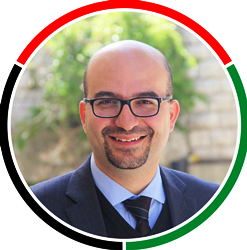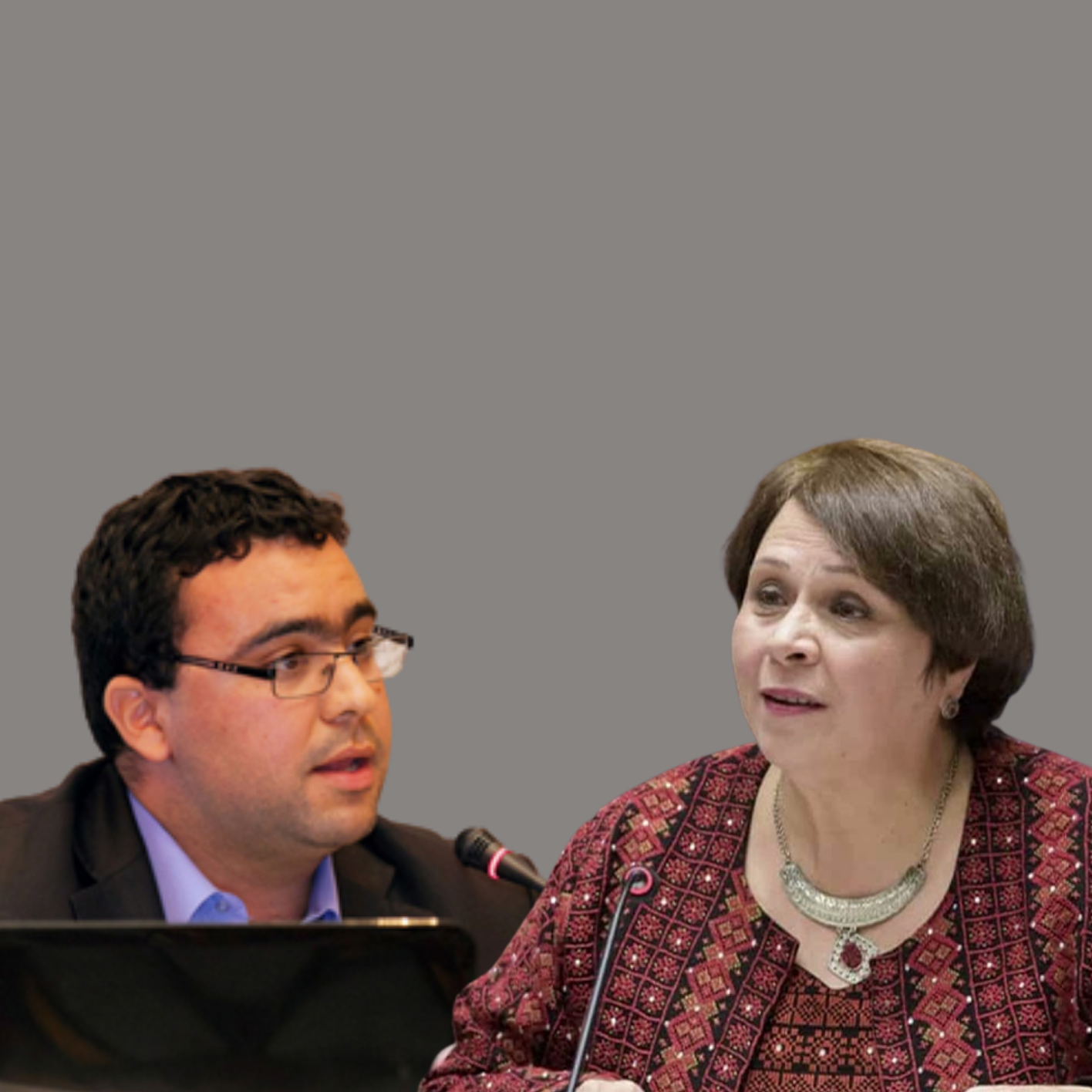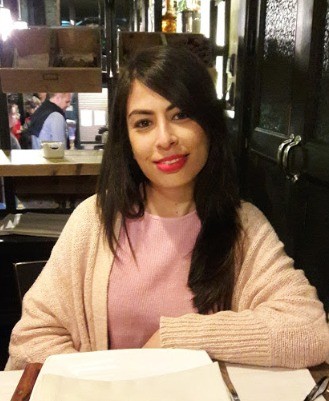
- We worked within an emergency austerity budget that resulted from Israel’s piracy of Palestinian money
- Jerusalemite women and youths are at the core of the development plan for Jerusalem
- During my last arrest, I was charged with leading the response to the pandemic in Jerusalem
- Politically, we are facing Israeli-American vigilantism, which is aimed at undermining our rights
- Jerusalemites cannot be bought or sold with a handful of food or money. They are fully aware of the “stick and carrot” approach
The role of civil society organizations is extremely important; they should not change their character or messages in society
“Hosted by MIFTAH” conducted the following interview with Mr. Fadi Hidmi, Minister of Jerusalem Affairs in which he showcased the ministry’s work and developments in the city in spite of the huge challenges and impediments imposed by the Israeli occupation.
**How has the Jerusalem Affairs Ministry dealt with the coronavirus pandemic? How have you addressed the needs of Jerusalemites?
The Jerusalem Ministry is part of the government system and part of the state of emergency declared in Palestine in response to the pandemic. From the beginning, we had instructions on how to deal with this crisis at the health and social levels from the government. In terms of health, I am speaking about Jerusalem hospitals in particular. We all know the Ministry of Health’s limitations of handling the affairs of Palestinians in Jerusalem. We all remember when Israeli occupation authorities in Silwan shut down its center and prevented any intervention by the Ministry of Health physicians when they were sent to conduct testing. Of course, there have also been huge social and economic ramifications, to which the Ministry has responded in spite of the challenges it faces by the occupation.
**Did the budget allocated for Jerusalem cover all of your needs or did it fall short?
The ministry operated within the austerity emergency budget that resulted from Israel’s piracy of Palestinian money. Nonetheless, the Prime Minister [Mohammed Shtayeh] reassured us that Jerusalem was a top priority. There is an undeclared budget related to the PA’s intervention in Jerusalem; the entire official system operating in Jerusalem falls under the Ministry of Jerusalem affairs budget. Even though Palestine and its public treasury are going through a very tough financial situation and we know how much Israel is making deductions, Jerusalem is always at the forefront in this regard.
**Has your ministry allocated special programs for Jerusalemite women? And are they part of the budget?
Palestinian women are an integral part of our people and one of the ministry’s priorities. I have always said that Palestinian women are the whole society. How could they not when they are the mothers of martyrs, the mothers of prisoners. The role of Palestinian Jerusalemite women throughout history has always been very deep-rooted and substantial. We recall Hind Husseini, Zleikha Shihabi and others; the list is long. In this context, we developed the Jerusalem Development Plan (the capital cluster) in which we focused on two basic and intersectional components: women and youth.
**How were you able to deal with the occupation while still having to respond to the pandemic?
After the US embassy was moved to Jerusalem and after the announcement of the “Deal of the century”, Israeli occupation authorities were given even more ammunition to fight anything and everything Palestinian. Hence, what we are up against in Jerusalem is a systematic war on everything that is Palestinian, whether official, institutional, or at the popular level. Everyone is a warrior because they represent the battle for sovereignty over the Arab, Islamic and Christian identity of Jerusalem. There is a plethora of harassments we have to face. Throughout this pandemic, Israel does not want us to serve our people in Jerusalem, but in light of its blatantly discriminatory failure to do so, it disregarded its responsibilities towards East Jerusalem in terms of any real preventative measures against Covid-19 including delays in testing. Israel became increasingly obstinate that it did not want us to stand by our own people, which is a violation of every humanitarian norm and international law as a civilian population under occupation. The occupation does not want us to progress or develop and this has been the problem in terms of protection for our people. However, none of these policies will ever deter us from moving forward in serving our people, especially during tough times.
**You have been arrested more than once along with other Jerusalemite officials. On what grounds are occupation authorities pursuing you?
There is a political dimension to Israel’s arrest of Palestinian officials in Jerusalem, under a false legal guise. They fall back on the so-called “interim agreement application law” that prevents Palestinian presence in Jerusalem, but this is nothing but a cover in every arrest. I was arrested four times in the course of a year. The same happened to the Jerusalem governor and to head of the Popular National Conference for Jerusalem, Bilal Al Natsheh. In short, anyone who works officially, institutionally or at the popular level is pursued and arrested. The last time I was arrested I was charged with leading the fight against Covid-19 in Jerusalem. Their excuses are always bogus because this is always about targeting our identity and our existence as an integral part of the popular fabric in Jerusalem. Jerusalem is our city and Jerusalemites are our people. There is no law on the face of this earth that can prevent any Jerusalemite or any human being in general from standing beside their people at any time much less during a pandemic.
**What is your relationship as a ministry with civil society institutions in Jerusalem? Have you been able to overcome the occupation’s obstacles together?
Integrative action is key at this stage. One example is the cooperation we saw in responding to the pandemic. There was unprecedented cooperation between institutions and volunteers and between youth and the official establishment. They carried out concerted efforts in serving Jerusalemites, which is the one focal point where everyone came together. It was this harmony and concordance which Jerusalemites were banking on and which they saw being strongly applied on the ground.
The truth is, Jerusalem is in need of this institutional interconnection; there can be joint action and clear plans for everything pertaining to the work of official institutions whether the ministry or governorate in terms of all official Palestinian action in Jerusalem.
**Does the Jerusalem Affairs Ministry have statistical data on Jerusalemites in the various sectors including unemployment, poverty and Israeli violations?
When we say that the ministry has a strategic cluster plan, this means we formulate our planning based on this essential data. We cannot talk about the housing sector without knowing the needs of this sector and without having the data on it. The same goes for all the other sectors. This is the method required for any strategic approach to succeed. The Ministry for Jerusalem Affairs works according to directives from the government and formulates its plans based on them. The Palestinian government is in a state of development. While it is true that it was affected by the coronavirus pandemic – we are currently working on data from this pandemic in terms of its emergency, relief, health and humanitarian aspects, but we are also not neglecting the developmental dimension on the ground.
In Jerusalem, there are conspiracies being hatched along with increased settlement activity, which have imposed realities on us that we must address in terms of its current and strategic repercussions. We must also not forget the city’s international dimension since Jerusalem has a presence in the international arena.
**From a political standpoint, how has the Ministry of Jerusalem Affairs dealt with the recent American positions on Jerusalem?
We are up against Israeli-American vigilantism. The United States is taking the lead and Israel is following, which is contrary to what used to happen in the past. Israel and the US are in one basket and the world is in another. Of course there are countries that have not taken a declared stance on this American position but overall, EU countries and many other countries in the world are standing against the US position regarding Jerusalem and Israel’s annexation plans for the Jordan Valley. We cannot underestimate the dangers of the next stage but we have and will continue to combat these developments as they come along. That is why we called on the international community to provide us with the necessary protection for our people, including in occupied Jerusalem.
What the United States and Israel are doing only serves the law of the jungle and is not in line whatsoever with international law, conventions or resolutions that confirm this is occupied territory and that the occupier must provide protection for all those under its rule.
**In light of the current political situation and possible developments, are you concerned about the future of the PA and the possibility of its collapse?
The PA is not disconnected to the overall Palestinian reality. Therefore I am not concerned about the people or PA because it is part of this people and all of its components are part of this popular structure. Jerusalemites have always proven they take the initiative and that they get stronger with every hardship. I am not worried. Palestinians will always prevail and our positions will never be replaced. We have always faced predicaments and crossroads but our national constants have never changed and never will. Nor will they ever be compromised by blackmail or pressure.
**The Israeli Jerusalem municipality is trying to play a central role in citizens’ affairs. As a ministry, how do you see this sudden shift in the municipality’s position?
This is ultimate naiveté on their part. Jerusalemites cannot be bought or sold with a handful of food or money. They stand in the face of Israeli bulldozers that come to tear down their homes. The Israeli municipality is the party that imposes exorbitant taxes on Old City merchants and is responsible for all of the policies aimed at driving them out. The collective memory of Palestinians is not weak and neither is their short-term memory. Israel has a plan that cannot be beautified; there are too many witnesses and too many tragedies. We are a people that was not born yesterday; the stick and carrot approach is something they know well.
**How do you think the current political reality will reflect on the Palestinian narrative in confronting the occupation and in developing a global vision more supportive of the Palestinian people?
The first and final lesson learned is that the coronavirus pandemic proved to the Palestinians, the Israelis and to the world that Jerusalem is not united and that Jerusalem is for the Palestinians alone. This was confirmed by the way in which Israeli authorities dealt with Jerusalemites during the pandemic. It was brazenly racist in a way that no one can deny in terms of their disregard and neglect towards the Palestinians. Another lesson learned is that the wager should always be on Jerusalemites. They have taught us for years that Jerusalemites are always on the ground and are always the ones that take the reins of initiative. They will never trust those who demolish their homes and exercise such brazen racism against them.
I think after this pandemic is over, a new perspective will evolve in the world; there will be earthshattering economic repercussions. If we take into account the setback in economic indicators since the start of the coronavirus pandemic, we know we are up against a difficult economic impact. However, the Palestinians have prior experience in dealing with such crises, which has helped us avoid a lot of problems. Responding to the current crisis will be one of our biggest challenges. Success will be measured by how comprehensively we deal with the crisis and all of its sub-problems and this is what we are already seeing from the Palestinian leadership.
**Will this crisis impact the role of civil society organizations which work on programs addressing the national narrative and identity?
The pandemic may have an impact on this role at present and perhaps on its situation in the future but it will not impact the overall situation for these organizations. CSOs exist in order to serve a strategy that supposedly has clear markers and which are not changed or replaced. The only thing replaceable are the tactics of any given stage and the short and mid-term strategies of that stage. However, CSOs should not change their character, message or presence in society, only their interim approaches and tactics so they can deal with the reality, in this case one that has been imposed on the entire world because of this pandemic.








